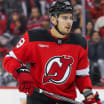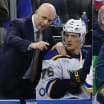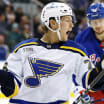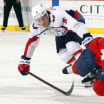Cassidy firing has Bruins at crossroads entering next season
New coach, Bergeron status could determine if Boston makes Cup run or rebuilds
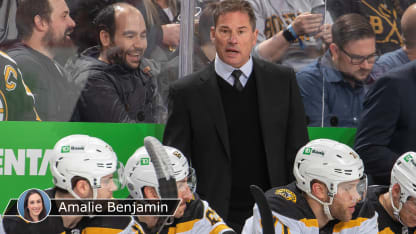
Uncertainty abounds for Boston, which fired Bruce Cassidy as coach Monday and has yet to hear from captain Patrice Bergeron about a return to the NHL for 2022-23.
Ahead are two paths: The current core taking a last run at the Stanley Cup that has eluded the Bruins since they won it in 2011 and came one win shy in 2019, falling to the St. Louis Blues in Game 7 of the Stanley Cup Final, or a rebuild of sorts, with the team heading back to the drawing and drafting boards.
Neither path is without its bumps.
"We're a competitive group and we're going to remain a competitive group," general manager Don Sweeney said Tuesday. "Though we may need to infuse [younger players] at some point in time, if we have the injuries and things that catch up to you that you just can't get out from under, that's a problem.
"And Bergeron could be a direction shift, as well."
The Bruins, who went 51-26-5 and were the first wild card into the Stanley Cup Playoffs from the Eastern Conference, start from the idea that they could have and should have done better in the postseason, where they fell in seven games to the Carolina Hurricanes in the first round.
Sweeney said he believed that the Bruins didn't play up to their capabilities, and that they needed a new voice, which led to the firing of Cassidy, something Sweeney called "a very, very difficult decision."
He was clear, though, that he didn't believe that Cassidy had lost the dressing room.
"I felt that both the message and how it was being delivered and, more importantly maybe, how it was being received" was where Cassidy fell short, Sweeney said. "I think the players felt they were very well-prepared, but at times, young and old, they struggled. And sometimes that's the voice that's in their head.
"Ultimately I had to make a decision that takes us in a different path."
But exactly what path that is remains unclear.
Bergeron's decision will play a big part. The center is an unrestricted free agent and has yet to inform the Bruins whether he will re-sign with them or retire. David Krejci could have an impact too, if the 36-year-old forward opts to return to the Bruins after playing last season in the Czech Republic. Sweeney said he has been in contact with Krejci's representatives, though not with Krejci himself.
Injuries are a major factor, as well, with significant players having surgeries in the past couple of weeks and expected to miss the start of the season. Defenseman Charlie McAvoy (left shoulder) and top-line forward Brad Marchand (both hips) are each likely out until December. Defenseman Matt Grzelcyk (right shoulder) is slated to return in November.
Asked if the Bruins could be in for a rebuild of sorts, Sweeney said, "I feel our group, what we were able to accomplish during the year, in the bulk of January, February or March, is a good hockey team. Now that being said, with the injuries that we have, when the players come back health-wise, that could dictate that. The start that we get off to may dictate that."
Sweeney referenced 2015-16, his first season as GM and a pivotal one for the Bruins. It was at the 2015 NHL Draft where Boston traded forward Milan Lucic to the Los Angeles Kings and defenseman Dougie Hamilton to the Calgary Flames. The Bruins ended up with the No. 13, 14 and 15 picks in the draft, and used them on defenseman Jakub Zboril and forwards Jake DeBrusk and Zach Senyshyn.
Zboril is still developing, DeBrusk requested a trade earlier this season before scoring four points (two goals, two assists) in the playoffs, and Senyshyn is out of the organization.
"We've been a team that's been very competitive. I want to continue to do that," Sweeney said. "It may take a time period where, not unlike [2015], we felt that we needed to make some changes in where we had several players on long-term deals and I made some very tough decisions at that point in time trying to infuse some younger players. At times we did it well and other times we fell short. Fully acknowledge that along the path here as well.
"We need to continue to do a better job in all those areas if we hope to remain competitive."
Sweeney emphasized that the decision to fire Cassidy was not made because of players' wishes.
"They're not driving the bus in terms of making my decisions," he said.
But communication skills are going to be important for the next coach of the Bruins. Sweeney said he has compiled a list of potential candidates, but also that he's not in a rush to make any decisions. He added that previous NHL coaching experience is not a prerequisite for the job.
"The coach has to have the communication skills to be able to bridge that gap with older and younger players," Sweeney said. "I think that's paramount now with integration. … The new coach is going to have to be able to communicate and bridge that gap from older players, holding them to a standard that I think we all feel is necessary.
"And in this town, it is necessary to hold a team to a competitive standard. That coach has to walk that walk."
So does the general manager, who was asked about his ability to continue to lead the Bruins. Though Sweeney's contract is up, Neely said last month that he would return, though the sides have yet to finalize that deal.
In Sweeney's seven seasons as GM, the Bruins are 313-162-57 in the regular season, with a .641 points percentage, which is third best in the NHL in that span.
"I don't think I've lost faith in myself as a manager," Sweeney said. "I don't think our winning percentage over the last six years, seven years that I've been a general manager would necessarily support that. We haven't won. That's what supports that. And that's why I stand up here today to try and make the necessary changes. And I will.
"And to answer your question, if I don't, guess what? Somebody else will be standing up here."

